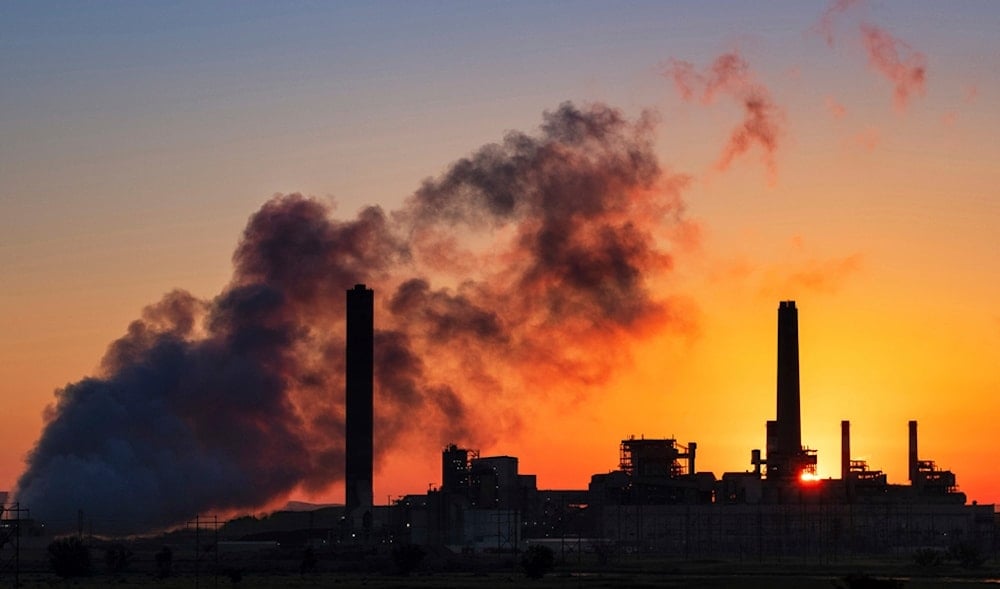Air pollution kills 2,000 children per year: Reports
Studies have found that air pollution has increased as the second biggest health hazard impacting mortality rates among children and adults alike.
-

A coal-fired power plant is silhouetted against the morning sun on July 27, 2018, in Glenrock, Wyoming. (AP)
Air pollution is killing almost 2,000 children under the age of five every day, The Guardian reported, overtaking poor sanitation and lack of clean water, and making it the second most dangerous health hazard for children around the world.
A study by the Health Effects Institute (HEI) found that over eight million adult and child deaths were caused by rising indoor and outdoor air pollution in 2021.
Contaminated air surpassed tobacco use and high blood pressure to become the second biggest killer globally. Among children under five, it stands second to malnutrition as a health hazard that could cause mortality.
This year’s State of Global Air report, published by the HEI in 2017 and produced with UNICEF, reveals that children in poorer nations are facing severe consequences from air pollution. The death rate related to air pollution among children under five is 100 times higher in most African countries compared to high-income countries.
Pallavi Pant, the report's lead author and head of global health at HEI, highlighted the significant disparities the report uncovered, noting that young children, older adults, and those in low and middle-income countries bear the brunt of the burden.
High PM2.5 levels related to poor health
The report identifies tiny particles known as PM2.5, which are smaller than 2.5 micrometers in diameter, as responsible for over 90% of global air pollution deaths. These particles can enter the bloodstream and impact various organs, linking them to lung disease, heart disease, stroke, diabetes, dementia, and miscarriage.
The report underscores the widespread and harmful effects of PM2.5 pollution, stating that high levels of these particles are now the most reliable indicator of poor health outcomes worldwide.
Kitty van der Heijden, UNICEF's deputy executive director, emphasized that inaction on air pollution is severely impacting the health and well-being of the next generation. She stressed the urgent need for governments and businesses to use data and estimates to implement child-focused measures to reduce air pollution and protect children's health.
The HEI report also indicates that climate change is worsening air quality. Severe and prolonged droughts, drier lands, wildfires, and dust storms are increasing particulate matter in the air. Additionally, higher summer temperatures exacerbate the effects of airborne pollutants like nitrogen oxides, which can more easily convert to ozone, a harmful gas. In 2021, long-term exposure to ozone contributed to nearly half a million deaths.
What could be done?
Addressing air pollution can also benefit the climate. In 2021, about half a million child deaths were linked to indoor air pollution, mainly from cooking with dirty fuels like biomass, charcoal, paraffin, and coal. Switching to cleaner fuels, such as solar cookstoves, could significantly reduce PM2.5 and carbon dioxide emissions, The Guardian stated.
Globally, 2.3 billion people lack access to clean cooking fuels. The International Energy Agency (IEA) estimates that solving this issue in sub-Saharan Africa alone requires about $4 billion annually until 2030. A recent global summit raised $2.2 billion for projects aimed at transitioning to cleaner cooking methods across the continent.
Fatih Birol, IEA's executive director, emphasized that this issue should be a global priority due to its impacts on health, climate, economies, and gender equality, as women and girls often gather firewood. He noted that the problem has been overlooked for too long.
The State of Global Air report, using data from the 2021 Global Burden of Disease study, covered over 200 countries and territories. Previous reports have shown that almost everyone breathes unhealthy air daily and that dirty air kills half a million babies each year.
EU27 can save 238,000 lives/yr by following WHO pollution guidelines
The European Environment Agency revealed that approximately 238,000 air pollution deaths could be prevented each year if the EU27 countries actually followed the World Health Organization guidelines for air pollution. It added that more than 400,000 deaths could also be prevented if particle air pollution was avoided completely.
The EU Council agreed on February 20 on new legislation for clean air for 2030 and beyond. A new study revealed the expected benefits that could arise from reductions in air pollution due to traffic and home heating if these new legal limits are met.
The study focused on 41 European countries and discovered that a 20% drop in road traffic pollution could decrease annual excess deaths across Europe by about 7,000 people a year by reducing particle pollution. Diving deeper, they concluded that Germany tops the chart with potential decreases of more than 1,000 deaths annually, while in the UK and Italy, it would be more than 500. The latter estimates were based on air pollution and health statistics from 2015.
In parallel, a 20% decrease in air pollution from home heating would decrease the number of deaths by approximately 13,000 each year, which, in turn, helps East and Central Europe the most because of their high use of solid fuel for heating. Germany, Italy, Poland, Ukraine, and Turkey would have at least 1,000 fewer deaths each, while the UK would experience at least 650 fewer deaths.
The new study also revealed that more than half of the benefits would come from fewer deaths specifically those caused by heart attacks, strokes, and type 2 diabetes, as well as lung cancer.
Read more: Environmental destruction in Gaza yet to make a dent in global conscience

 5 Min Read
5 Min Read








